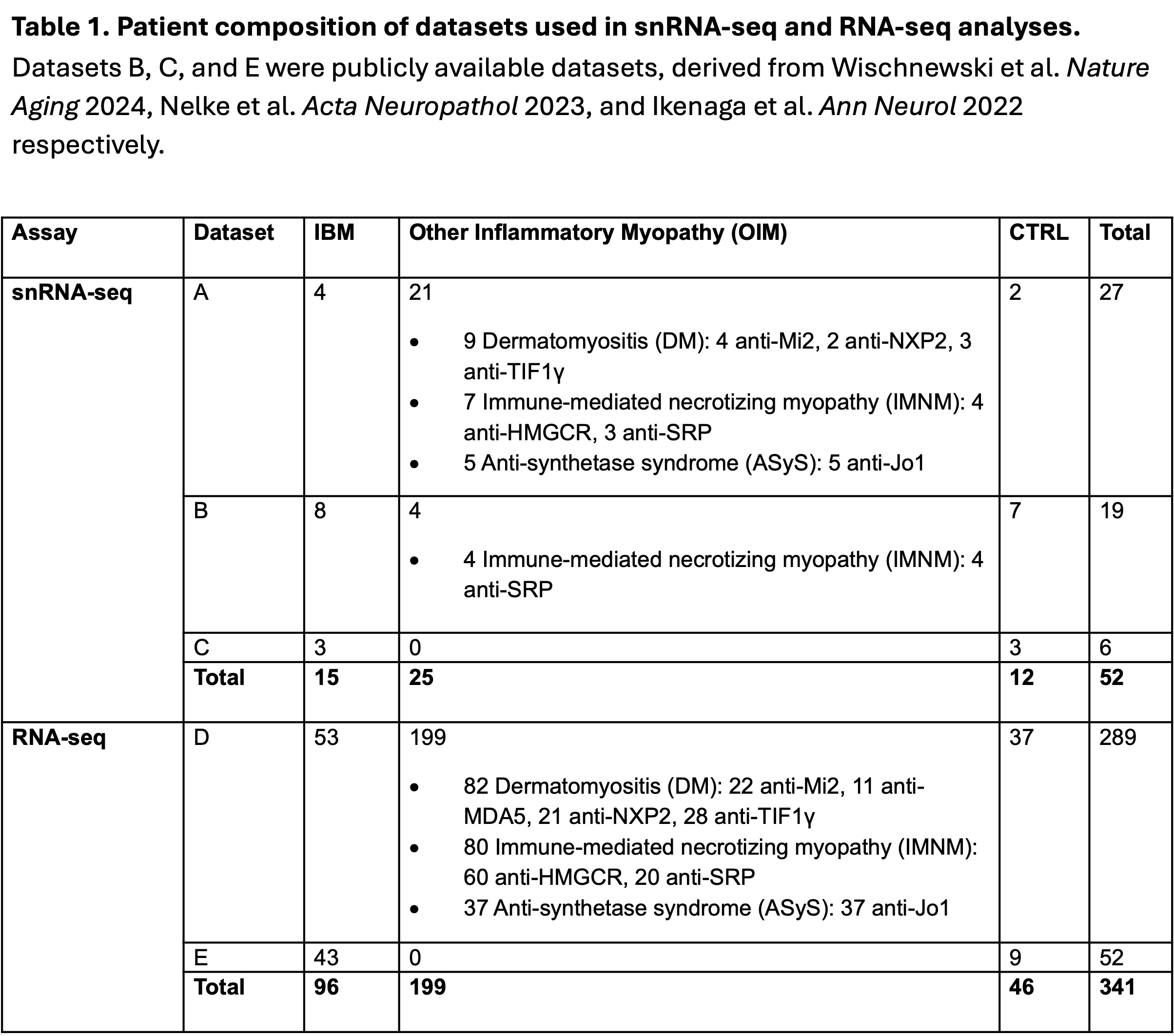Session Information
Date: Monday, October 27, 2025
Session Type: Abstract Session
Session Time: 10:30AM-10:45AM
Background/Purpose: Although inclusion body myositis (IBM) is an inflammatory myopathy, there are no effective immunomodulating agents, underlying the need for better understanding of its pathogenesis. Previous studies have implicated KLRG1+ TBX21+ CD8+ T cells as drivers of IFNG-mediated inflammation in IBM. Based on previous reports, we hypothesize that myeloid dendritic cells (mDCs) may activate these CD8+ T cells. Here, we sought to identify and characterize mDC subsets in IBM muscle and examine their correlation with transcriptomic markers of disease activity.
Methods: We analyzed skeletal muscle single nuclei RNA-seq (snRNA-seq) data from three datasets (A-C), including 15 IBM patients, 25 other inflammatory myopathy (OIM) patients, and 12 control (CTRL) patients (Table 1). We also analyzed skeletal muscle bulk RNA-seq data from two datasets (D-E), including 96 IBM patients, 199 OIM patients, and 46 CTRL patients (Table 1).snRNA-seq data from Datasets A-C was merged and analyzed using Seurat/4.4.0 within R/4.4.1. Data underwent quality control, normalization, integration, UMAP generation, cluster identification to identify mDC subsets, and cluster-specific gene identification (adjusted p< 0.001 versus all cells and myeloid cells, p< 0.05 versus each cell cluster). RNA-seq data was analyzed separately using R/4.4.1 and Python/3.9.6. Counts underwent normalization using trimmed means of M values. Normalized counts were used to generate heatmaps of median mDC marker expression by myositis group and Spearman correlation heatmaps of mDC markers with transcriptomic markers of disease activity.
Results: Clustering of snRNA-seq data revealed ten main clusters. Unsupervised subclustering of the myeloid cells revealed two distinct mDC subsets: type 1 conventional dendritic (cDC1) cells and mature immunoregulatory dendritic (mregDC) cells. A third mDC subset, type 2 conventional dendritic (cDC2) cells, was identified by manually selecting cells from the main monocyte cluster expressing the cDC2 marker CD1C and lacking expression of the specific monocyte marker C5AR1. All three mDC subsets expressed subset-specific markers and were relatively increased as a proportion of total cells in IBM patients compared to other groups. Notably, cDC1 cells exhibited the highest average expression of the two ligands of KLRG1, CDH1 and CDH2, while both cDC1 and mregDC cells specifically expressed the fate-specifying cytokine subunit for TBX21+ T cells, IL12B (Figure 1).In the RNA-seq data, expression of specific mDC markers for all three subsets appeared higher in IBM samples compared to non-IBM samples across both datasets. In addition, all three subsets appeared strongly correlated with markers of the IFNG pathway and T cell subsets, including KLRG1 and TBX21, in IBM samples to a greater degree than in OIM and CTRL samples (Figure 2).
Conclusion: Three mDC subsets are increased in IBM muscle compared to OIM and CTRL muscle. Markers of these subsets correlate with markers of the IFNG pathway and T cell subsets. We propose that cDC1 cells activate IFN-γ-secreting KLRG1+ TBX21+ CD8+ T cells via specific expression of the ligands of KLRG1, CDH1 and CDH2, and IL12B.
To cite this abstract in AMA style:
Kirou R, Pinal-Fernandez I, Casal-Dominguez M, Pak K, Ikenaga C, Nelke C, Dell'orso S, Naz F, Islam S, Gutierrez-Cruz G, Stenzel W, Selva-O'Callaghan A, Milisenda J, Mammen A. Myeloid Dendritic Cell Subsets Characterize Muscle of Inclusion Body Myositis Patients and Correlate with KLRG1+ and TBX21+ CD8+ T cells [abstract]. Arthritis Rheumatol. 2025; 77 (suppl 9). https://acrabstracts.org/abstract/myeloid-dendritic-cell-subsets-characterize-muscle-of-inclusion-body-myositis-patients-and-correlate-with-klrg1-and-tbx21-cd8-t-cells/. Accessed .« Back to ACR Convergence 2025
ACR Meeting Abstracts - https://acrabstracts.org/abstract/myeloid-dendritic-cell-subsets-characterize-muscle-of-inclusion-body-myositis-patients-and-correlate-with-klrg1-and-tbx21-cd8-t-cells/


.jpg)
.jpg)